Teaching Methods MCQs for the posts of Educators / ESE / Teachers (Set-II)
Also Check: Teaching Methods MCQs for the posts of Educators / ESE / Teachers (Set-I)
Also Check: Teaching Methods MCQs for the posts of Educators / ESE / Teachers (Set-II)
All of the following are examples of intrinsic motivation except
(a) Encouraging pupils to help develop the aim of a lesson
(b) Permitting pupils to evaluate each other’s answers
(c) Utilizing pupils backgrounds and experiences
(d) None of these
Answer: b
The most important objective of committee work is to have children ______.
(a) Practice parliamentary procedure
(b) Develop the leadership skills of the high achievers
(c) Develop skills of cooperative learning and problem solving
(d) None of these
Answer: c
All of the following statements about children are correct except that______.
(a) Older children in elementary schools are less prone to illness than younger children
(b) Many children do not eat proper breakfasts
(c) Girls are superior to boys of the same age in mathematical abilities
(d) None of these
Answer: c
All of the following are descriptive of good teaching except that ______.
(a) Creative methods can used to achieve traditional goals
(b) Teachers may fail to achieve satisfactory adjustment of some children despite use of optimum procedures
(c) Teachers should refer all children with emotional problems to the guidance counsellor
(d) None of these
Answer: c
A sixth-grade class includes a group of children reading on the fourth-grade level. Of the following, the best material to use with this group is a ______.
(a) Fourth-grade basal reader
(b) Tape recorder
(c) High interest, low level book of stories
(d) None of these
Answer: c
A child who frequently loses his/her place where reading can be temporarily helped by _____.
(a) Allowing him/her to finger-point
(b) Giving him/her a card to place under each line being read
(c) Providing him/her with a large-print reader such as those used by the visually handicapped
(d) None of these
Answer: b
Of the following activities in a science class, the one with least educational value is______.
(a) Viewing a filmstrip
(b) Constructing a model
(c) Reading about a simple experiment
(d) None of these
Answer: c
The operation of the class library should be the responsibility of______.
(a) Rotating committees of pupils
(b) Volunteer parents
(c) The children who contributed the books
(d) None of these
Answer: a
Group tests that have norms for each grade and that that are administered in accordance with uniform procedures listed in a manual of instruction are called______.
(a) School-wide finales
(b) Quizzes
(c) Standardized tests
(d) None of these
Answer: c
In comparing the lecture and developmental lessons, all of the following are true except that______.
(a) There is more pupil activity in the developmental lesson
(b) Slow children drive more benefit from a lecture than brighter children
(c) The lecture method is more conducive to larger classes
(d) None of these
Answer: b
A teacher notes poor attendance in class on the day when weekly tests are given. The teacher should ______.
(a) Call the parents of the absentees
(b) Schedule tests throughout the week
(c) Do nothing
(d) None of these
Answer: b
When the majority of pupils in a science class are well below grade level in reading, the teacher should ______.
(a) Read to the class from the text book
(b) Plan many hands-on activities
(c) Show many filmstrips
(d) None of these
Answer: b
Career education should begin______.
(a) In kindergarten
(b) In the third or fourth grades
(c) When the child enters junior high school
(d) None of these
Answer: a
Of the following birds of advice given by an experienced teacher to a new colleague, it would be best to ignore the one that state______.
(a) If you have a very shy child, don’t call on the child, wait until the child volunteers
(b) When a child misbehaves, first look for the reaction
(c) Ask many “how” and “Why” questions and not too many “what and who questions
(d) None of these
Answer: a
To be successful with an overactive child, the teacher should______.
(a) Give the child extra written work so he/she will have a reason for remaining in his/her seat
(b) Allow the child to leave his/her seat whenever he/she becomes restless
(c) Provide the child with purposeful activities that legitimize the need for movement
(d) None of these
Answer: c
The teacher of a class with a sizeable number of Spaniards notices that the Spaniards and the other children form two separate groups on the school playground. The teacher is best advised to______.
(a) Ignore the situation
(b) Suggest that the principal organize a separate class of Spaniards
(c) Organize those playground games that promote co-mingling
(d) None of these
Answer: c
A class assembly programme best contributes to educational goals when it______.
(a) Presents a well known children’s play written by a talented author
(b) Features the best singers or actors in the class
(c) Is praised by parents as being “just like a Broadway show”
(d) None of these
Answer: c
When planning to develop the powers of creative thinking, the teacher should allow for all of the following experience except______.
(d) Solving of all problems through use of a well practiced formula
(b) Failure of an experiment in science
(c) Inability to locate a book in the school library
(d) None of these
Answer: a
All of the following are applicable in good motivation except that it should be______.
(a) Be brief
(b) From the teacher
(c) Related to the lesson that follows
(d) None of these
Answer: b
Of the following statements above slow learners and bright children, the correct one is that______.
(a) Both groups strive for success in school
(b) Slow learners are likely to have greater manual dexterity
(c) Slow learners are likely to be physically stronger
(d) None of these
Answer: a
A small school assigns a class teacher to several hours of school library management. Of the following, the teacher’s top priority should be to make sure that______.
(a) The library is used appropriately by maximum number of children
(b) Only books that are popular with the children are ordered
(c) The card catalogue is in order
(d) None of these
Answer: a
During a conference, the mother of the third grader asks the teacher how she can help improve her child’s reading ability. Of the following the poorest recommendation is that she should______.
(a) Encourage the child to make regular visits to the public library
(b) Severely limit the child watching of television
(c) Take the child on trips to interesting places in the community
(d) None of these
Answer: b
Creative writing should be an activity planned for______.
(a) Only those children reading on grade level
(b) Only those children who want to write for the class newspaper
(c) All children
(d) None of these
Answer: c
Of the following possible procedure to procure to follow after the class has taken a spelling test, the teacher should not______.
(a) Permit pupils to discuss the answers
(b) Correct the paper of the pupils who failed to finish the test
(c) Assign a drill to the entire class based on the most frequently misspelled words
(d) None of these
Answer: c
Of the following, the one least important to success in beginning reading is______.
(a) Knowledge of the alphabet
(b) Normal vision and hearing
(c) Directionality
(d) None of these
Answer: a
Lesson planning should be guided primary by the consideration of______.
(a) Meeting the needs of the average child in the class
(b) Creating a happy classroom environment
(c) The curriculum goals
(d) None of these
Answer: c
The best procedure for a teacher to adopt with a pupil who frequently stammers in class is to______.
(a) Afford the child ample opportunity to recite to the class
(b) Suggest that the parents seek professional help
(c) Suggest that the parents apply of home instruction
(d) None of these
Answer: b
Of the following, the most promising step for a teacher to take in order to improve class discipline is to______.
(a) Note specific infractions for class rules in the marking book
(b) Evaluate his/her material, methods, and approaches toe children
(c) Consult the class and agree upon a graduated series of punishments
(d) None of these
Answer: b
A small machine used in the reading programme to increase rate of speed is the ______.
(a) Mnemonic device
(b) Sphygmomanometer
(c) Tachistoscope
(d) None of these
Answer: c
A teacher should be catechized for all of the following practices except ______.
(a) Undermining the role of the parent
(b) Becoming overly friendly with pupils
(c) Exercising firm leadership
(d) None of these
Answer: c
Team teaching is chartered by all of the following except______.
(a) The use of master teacher
(b) Inflexible groupings
(c) Group planning
(d) None of these
Answer: b
A paraprofessional may properly engage in all of the following activities expect______.
(a) Assisting on parents night
(b) Conferring with parents about a child behaviour
(c) Making short answer tests
(d) None of these
Answer: b
The teacher introduces a problem-solving lesson with a good motivation and then asks for proposed solutions. No suggestions are forthcoming. The teacher is best advised to______.
(a) Stimulate pupil thought by advancing a few personal proposals
(b) Tell the student to read their text
(c) Show an interesting filmstrip
(d) None of these
Answer: a
Individual differences within a class are best handled by______.
(a) Coaching slow children after school
(b) Giving the bright students free reading time
(c) Organizing groups for specific purposes
(d) None of these
Answer: d
A quite, reserved fourth grader brings roadmaps to school and looks at them whenever he gets a chance. The teacher should ______.
(a) Encourage the pupil to talk about them during a show and tell period
(b) Tell the pupil the leave the maps at home
(c) Take the maps away
(d) None of these
Answer: a
The tightly structured lesson that is taught with little flexibility is least conductive to the learning of the student who ______.
(a) Is culturally disadvantaged
(b) Is hyperactive
(c) Has a 125 IQ
(d) None of these
Answer: c
The discovery method of teaching is best exemplified by______.
(a) Play activities
(b) Rote learning
(c) Independent study projects
(d) None of these
Answer: c
The best procedure for a teacher to follow when a pupil habitually calls out in class is to______.
(a) Ask for a percent conference
(b) Put a demerit in the making book on each occasion
(c) Call on the pupil to answer questions that are within his/her ability level
(d) None of these
Answer: c
Akmal tells her teacher that three other girls, who the teacher knows are Akmal’s friends, copy from each other on all the tests. Of the following the teacher is best advised to first______.
(a) Give the three girls a zero on the last two tests
(b) Confer with Akmal’s mother
(c) Try to understand why Akmal said this
(d) None of these
Answer: c
Most educators agree that oral reading______.
(a) Comes naturally to good readers
(b) Is do difficult to do well that it is waste of time to teach it
(c) Requires an audience situation
(d) None of these
Answer: c
After a lesson is taught the teacher’s lesson plan should be______.
(a) Sent to the supervisor for evaluation
(b) Annotated
(c) Filed for use by a substitute teacher
(d) None of these
Answer: a
Of the following, the least appropriate opening day activity is______.
(a) Saluting the flag
(b) Assigning homework
(c) Outlining the day’s schedule
(d) None of these
Answer: b
The discovery method of learning is best exemplified by______.
(a) Programmed instruction
(b) Experimentation in a science laboratory
(c) Team teaching
(d) None of these
Answer: b
You find that in your class, a group of students are not obeying you. You will ______.
(a) Avoid the students
(b) Punish them
(c) Speak and convince them
(d) None of these
Answer: c
You have a brilliant student who is very good at studies but not taking part in curricular activities. You will ______.
(a) Convince him by counselling
(b) Avoid him
(c) Inform parents/Principal
(d) None of these
Answer: a
In your class you came to know that the mother of one student is expired. You will ______.
(a) Behave in a way that you are not aware of anything
(b) Speak with that student about his mother
(c) Try to make that student normal in class.
(d) None of these
Answer: c
In the class you come to know that a student wants to work part time to give his school fees. You will ______.
(a) Pay his school fees
(b) By collecting donation from others
(c) Make him understand about the consequences and inform his parents.
(d) None of these
Answer: c
On a school education trip, a student gets hurt. You will ______.
(a) After first aid send him back to school
(b) Inform the parents and Principal and take him to nearest hospital
(c) Shout for help from others
(d) None of these
Answer: b
As a class teacher, you will tackle the regularly late coming students by ______.
(a) Punishing them
(b) Avoiding them
(c) Consulting them and their parents
(d) None of these
Answer: c
You will behave in class on extra arrangement by being______.
(a) Lenient
(b) Very strict
(c) Engaging them in some activity
(d) None of these
Answer: c

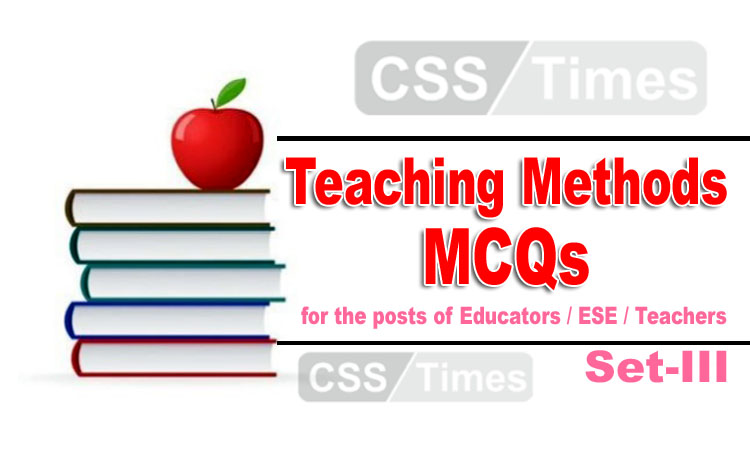
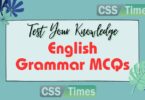
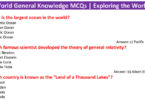
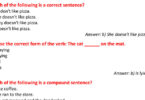
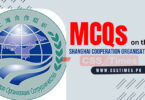


[…] Check Also: Teaching Methods MCQs for the posts of Educators / ESE / Teachers (Set-III) […]